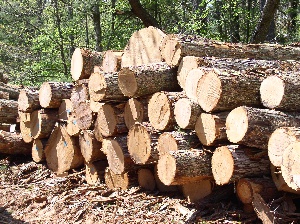Concerns have been raised by the Apremdo-Kwesiminstim Wood Workers Association over imminent enforcement of the Voluntary Partnership Agreement (VPA) between Ghana and the EU, with the woodworkers fearing for their jobs if the agreement is fully implemented from March 2014 as proposed.
The VPA, which was ratified by Ghana’s Parliament in 2008, seeks to end the export of illegal timber from Ghana into the EU. Its aim is to improve forest governance through ensuring that timber imported into the EU has complied with the legal requirements of the partner country -- in this case, Ghana.
The EU is one of the biggest markets for timber products and the VPA forms part of a 2003 action-year plan to combat illegal logging. While the EU has traditionally received about 60 percent of Ghana’s timber exports, last year the share fell to 20 percent.
Though chainsaw timber operations are illegal under Ghanaian law, around 84 percent of wood products from Ghana are produced from chainsaw activities, said Afreh Boakye, National Secretary of the Domestic Lumber Trade Association of Ghana (DOLTA) who was speaking at a wood industry stakeholders meeting in Takoradi.
The meeting was convened with support from the Business Sector Advocacy Challenge (BUSAC) Fund.
Mr. Boakye said about 74 percent of wood-sellers could potentially lose their jobs if the VPA comes into force.
“To forestall this, there is need to ensure a regular supply of lumber -- hence modalities being adopted by major stakeholders in the wood industry to ensure that heavy-duty saw mill supplies 40 percent of wood on the local market and artisanal millers supply 60 percent,” he said.
He said there is need for the creation of a timber depot to serve as another central wood-selling point, as currently exists in Sokobun at Kumasi in the Ashanti Region.
He advised woodworkers to ensure they register their operations in line with section 5 of the procurement policy in order to acquire vendor licences to do legitimate business.
Peter Zormelo, Trade and Industry Manager at the Timber Industry Development Division (TIDD) of the Forestry Commission, said in the 1950’s Ghana’s forest cover was 8 million hectares with a 6 million population. However, he said, this has now depleted to 1.8 million hectares with a 25 million population.
He explained that the VPA is to ensure that only legal timber is transacted in Ghana, adding that illegal lumbering creates a situation where people do not pay the right price for wood.
Promoters of the VPA say it will improve transparency and accountability by ensuring that timber products imported into the EU from Ghana have been legally acquired, harvested, transported and exported in compliance with local laws.
Implementing the VPA will also enable timber companies in the country to secure access to markets for timber export, and ensure that timber companies fulfil their social obligations by entering into a social responsibility agreement with communities in their operational area.
It will also minimise illegal chain-saw operations by strengthening structures for forest law enforcement, promoters say.
Although there was no obligation for Ghana to enter the VPA with the EU, once the agreement was signed it became legally binding on Ghana and the EU to trade only in timber or timber products that can be verified through a wood-tracking system as legal.
Ghana currently exports about 400,000 cubic metres of wood per annum and consumes 600,000 locally.
Business News of Tuesday, 3 September 2013
Source: B&FT













